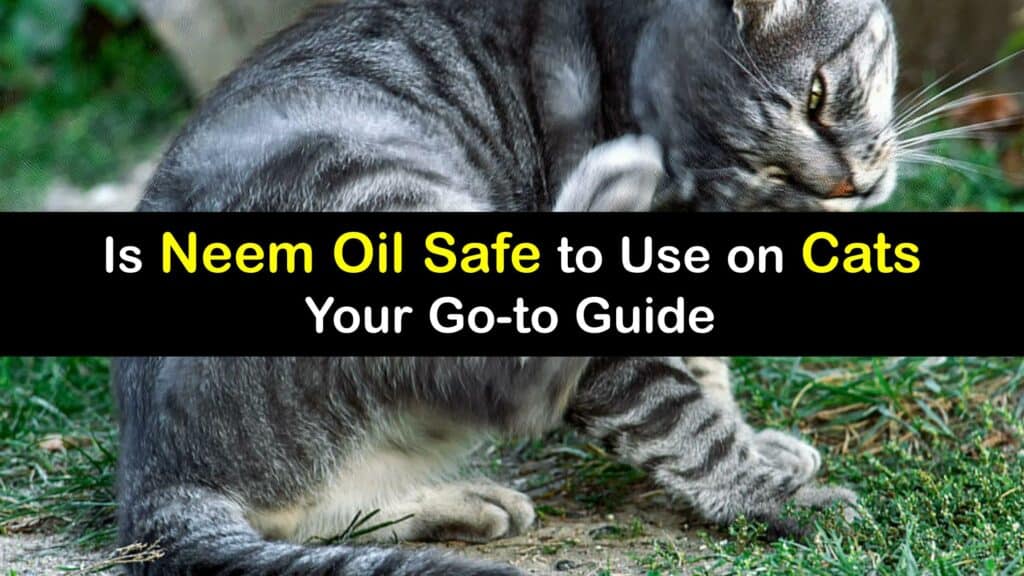Pet parents should always look for safe, effective ways to protect their animals from flea, tick, and mosquito bites. There’s a lot of conflicting pet safety information out there, and it’s sometimes hard to know what to trust. Is neem oil safe for cats? Learn the answer to all your questions in this go-to guide.
Humans in the Middle East domesticated cats approximately 12,000 years ago, and their physiology is still somewhat of a mystery to modern scientists. There aren’t a lot of studies compared to our K-9 companions, which leads to some misconceptions in the pest control world where our favorite felines are concerned.
We know cats are more sensitive to biological changes; their immune systems, metabolisms, and general well-being are at greater risk when exposed to concentrated chemicals. Unfortunately, most insect pest repellent contains an array of toxic chemicals. However, that doesn’t mean there aren’t safe, natural solutions to save your cat from insect bites this season.

Is Neem Oil Toxic to Cats?
There are a lot of legitimate questions revolving around the safety and efficacy of natural pest control methods. In this pet-safe article, find the answer to your questions about neem oil, safe practices, and more.
Learn how to make a fantastic DIY neem oil spray recipe for cats, discover important facts about other essential oils, and learn why pest protection is important for every animal.
Why Worry About Insect Repellent for Cats?
Fleas, ticks, and spider mites are annoying, sure, but the number one thing pet owners and veterinarians fear are mosquitoes and their capacity to carry heartworms. Just one infected mosquito bite is enough to set off a severe heartworm-based illness in your beloved best friend, and heartworm disease is just as unappealing as it sounds.
Parasitic worms infest your pet’s heart, lungs, and other organs via mosquito bites. These microscopic worms live and breed in your pet, causing Heartworm Associated Respiratory Disease (HARD) and sudden death.
Unlike dogs, there is currently no effective treatment for heartworm disease in felines, which makes it extra important to protect your kitty.

Does Anyone Make Mosquito Repellent for Cats?
The short answer is, not really. Pet insect repellents are primarily designed for dogs. There are a few commercial products marketed safe for cats; the reality is there aren’t a lot of controlled studies to support boutique pet products.
It’s also important to be aware of using products specifically designed for dogs around your cat. For example, many common flea and tick repellents for dogs contain ingredients like pyrethrin or permethrin, which are highly toxic to cats—even light contact through grooming risks exposure to harmful elements that negatively impact your feline friend.
Acute poisoning in your pet may include drooling, vomiting, difficulty breathing, and prolonged tremors. Cats are typically better at hiding symptoms than dogs, which means vigilance is essential. Contact the 24-hour, toll-free Pet Poison Helpline if you suspect exposure.
What is Neem Oil, Anyway?
Neem oil comes from a tropical plant called Azadirachta indica, or the neem tree. Often revered as the “village pharmacy,” the neem tree has been used for medical purposes in India for thousands of years.
Neem leaf is effective against certain infections, boils, burns, and other skin ailments, and neem twigs have long been used as toothbrushes in rural areas of India.
Neem oil extract contains Vitamin E, omega-6, omega-9, and beneficial compounds called triterpenes. These helpful ingredients act as an anti-inflammatory, antihistamine, and antiseptic in certain medicines. Neem extract is commonly found in consumer products like cosmetics, toothpaste, and pet shampoo.
Neem oil has many applications, but is neem oil safe for cats? Neem oil has benefits in the home and garden and is famous for its insecticidal abilities against pests and beneficial insects. The most effective active ingredient in neem oil is azadirachtin, which works against many common garden pests and some fungal infections, like powdery mildew.
Is Neem Oil Safe for Cats?
Is neem oil toxic to cats? Too much of a good thing doesn’t do any good; don’t use pure neem oil right out of the bottle for any animal. However, heavily diluted neem oil is safe for topical use on cats and is shown in several small studies to deter insects without causing skin irritation in your pet. It is also safe for dogs and pets of other types. Keep some on hand to use whenever bugs become a problem.
There are a few things to know if you’re considering neem oil to fight pests. Cats are near-constant groomers, which means they’ll be ingesting the neem spray.
Elderly cats or cats taking medications aren’t suitable candidates for neem oil. If your cat takes thyroid medications, oral diabetic medications, insulin, or hormone supplementation medication, consult your vet first.
Neem Oil Spray Recipe for Cats
Is neem oil spray safe for cats? Yes, when diluted to a 1:10 ratio, or less than 1% concentration. This neem oil spray recipe for cats is meant for weekly use and should relieve some of your pet’s pest problems this summer.
Clarified hydrophobic neem oil dilutes very easily and stores well for use as a convenient insect repellant during those months when insect activity is highest.
Combine the witch hazel, aloe vera juice, and neem oil extract in a small spray bottle for easy maneuverability. Shake the spray bottle vigorously to mix your neem spray ingredients, then lightly mist your cat’s coat.
If you prefer, use an organic carrier oil like coconut oil, olive oil, or almond oil to dilute the neem extract to a suitable percentage (about 1% for cats) and comb through your pet’s coat.
What are Carrier Oils?
Is neem oil toxic to cats? A carrier oil is meant to dilute essential oils to a level that’s safe for use in humans and pets. A carrier oil, also known as organic base oil, is a vegetable oil like almond oil, coconut oil, or olive oil. Neem oil isn’t dangerous when diluted with a safe carrier oil.
Unlike essential oils, carrier oils don’t contain a concentrated aroma, so they don’t increase the volatility of essential oils. Your cat may not appreciate the texture, although many don’t mind. Some cats prefer this type of application to a topical spray. Monitor your cat’s reaction, and adjust your delivery method for the best results.
Are Other Essential Oils Safe for Cats?
Cats differ from dogs in a variety of ways, but their biology may be the most crucial difference. For example, cats lack the liver enzyme systems necessary to process essential oils properly. For that reason, most essential oils are considered quite toxic to cats, especially when ingested orally.
Signs of essential oil toxicity include drooling, tremors, vomiting, breathing distress, and liver failure. Essential oils known to cause acute poisoning in cats include tea tree oil, eucalyptus, citronella, clove, citrus, cinnamon, wintergreen, peppermint, sweet birch, and pennyroyal.
There are many more, and it’s advised that you never use untested essential oils on your pet. Don’t be afraid to call the 24-hour Pet Poison Helpline with any questions.
Cedarwood essential oil is considered safe for your dog and cat. It smells great and has both antibacterial and antifungal properties. All essential oils absorb very easily through the skin and mucosa, meaning dilution must be less than 2% to be considered safe for use on your favorite feline; this spray is less than 1%.
Mix the witch hazel, aloe vera juice, and cedarwood in a small spray bottle. Mist your cat lightly, and use a grooming or flea comb to distribute the product through the cat’s fur. Apply weekly during peak insect season, and observe your pet for adverse reactions like skin irritation or loss of appetite.
How to Rid Your Yard of Mosquitoes
Ask any grandmother around the world, and she’ll likely say, “An ounce of prevention is worth a pound of cure.” They couldn’t be more right when it comes to mosquitoes. Make a safe space for your cat to hang around outside by doing a quick maintenance check.
Mosquitoes love warm, damp environments. Female mosquitoes may live as long as two months and lay around 500 eggs. Under ideal conditions, a mosquito egg becomes an adult in just four days.
You might see them hanging around the bird bath, rain-filled pots, or your kid’s swimming pool. Get rid of that stagnant standing water in your yard, and trim your bushes and plants to improve light penetration and air circulation.
Mix up a neem oil spray and use it to repel mosquitoes in the yard in strategic locations. Reapply as needed.
We hope that we’ve answered the age-old question, “Is neem oil safe for cats?” Of course, every pet is unique, and some circumstances prohibit the use of neem oil for pets, such as elderly animals or those taking medications.
It’s also helpful to check every product label for recognized certification, such as the Veterinary Oral Health Council or a Center for Pet Safety seal of approval.
It’s nice to note that neem oil eliminates many bugs. Neem oil kills bed bugs, spiders, squash bugs, and a variety of other pests.
For your peace of mind, the EPA confirms that neem oil has an incredibly low mammalian toxicity level and is generally well-tolerated and safe to use on most cats and dogs. However, when beginning a new treatment, it’s always best to start with a conservative amount, apply weekly, and gauge your pet’s reaction. When in doubt, ask your vet before adding something new to your cat’s routine.

If you loved getting an in-depth answer to the question, “Is neem oil safe for cats,” please share this article with friends on Pinterest or Facebook who love cats and are always looking for accurate health and pest control-related information.